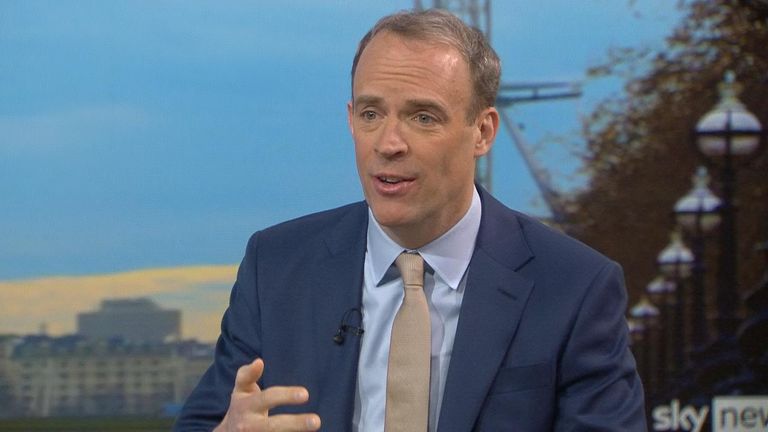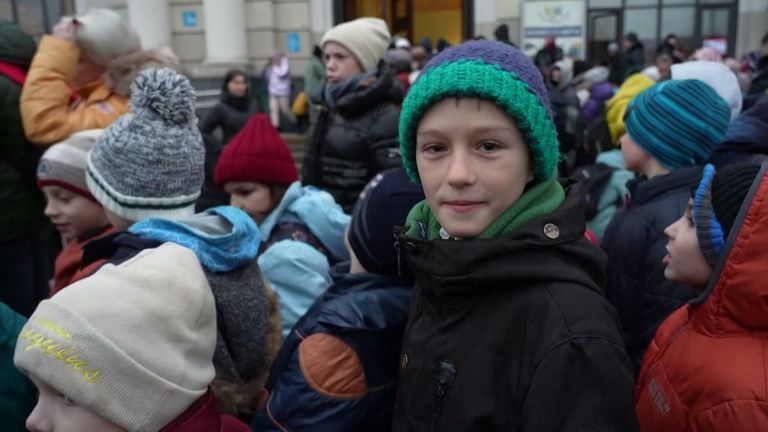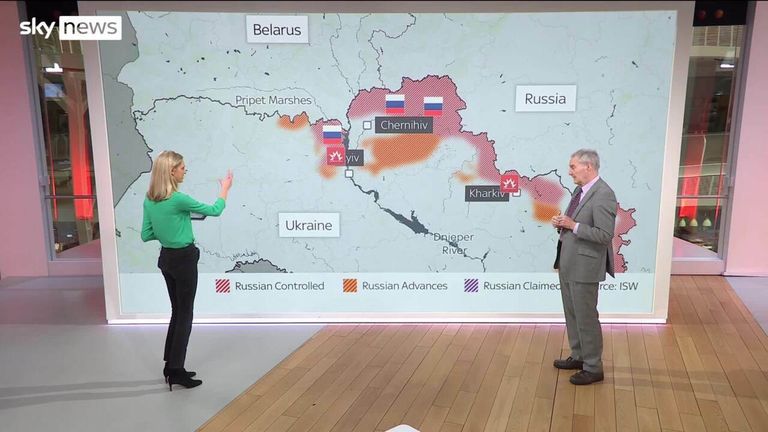The world must prepare for “even darker days ahead” over Russia’s invasion of Ukraine, Boris Johnson has said.
Writing in the New York Times, the prime minister said Western nations have “failed to learn the lessons of Russian behaviour” that led to Vladimir Putin launching his assault last month.
Live updates on Russia’s invasion of Ukraine
Key developments:
• Civilians cower on the ground with shells exploding overhead as they flee Russian assault
• Zelenskyy urges Russians to protest to ‘overcome evil’ as Putin demands surrender
• Fresh attempt to evacuate Mariupol fails as both sides blame each other
• Conflict could last ‘months, if not years’, deputy PM Raab warns
PM’s six-point plan for resolving crisis
“Have we done enough for Ukraine? The honest answer is no,” Mr Johnson wrote in a nearly 1,300-word essay published on Sunday.
The PM, who will host a number of world leaders in Downing Street this coming week, has set out a six-point plan for how he thinks the international community can resolve the crisis.
Canadian Prime Minister Justin Trudeau and Mark Rutte, PM of the Netherlands, will visit Number 10 on Monday.
On Tuesday, Mr Johnson will host leaders of the V4 group of central European nations – the Czech Republic, Hungary, Poland and Slovakia – which are already experiencing the impact of a humanitarian crisis that has already seen more than 1.5 million people flee Ukraine.
The PM held his latest call with Ukrainian President Volodymyr Zelenskyy on Sunday, telling him that “the British people stand fully behind the Ukrainian people”.
According to Number 10’s readout of the call, Mr Johnson told his counterpart that “international support and admiration for President Zelensky and the whole of Ukraine grows every day”.
Putin trying to ‘rewrite the rules’ of international order
In his NYT piece, Mr Johnson said “never in my life have I seen an international crisis where the dividing line between right and wrong has been so stark”.
He accused Mr Putin of trying to “rewrite the rules” of international order “by military force”.
The PM said world leaders “must not allow anyone in the Kremlin to get away with misrepresenting our intentions to find post-facto justification for their war of choice”.
In the months leading up to Russia’s invasion, Mr Putin expressed fears over the expansion of NATO and cited the potential of Ukraine joining the alliance as a reason for his attack.
PM claims Putin’s actions show ‘diplomacy never had a chance’
But Mr Johnson said Ukraine had “no serious prospect of NATO membership in the near future”.
“This is not a NATO conflict and it will not become one. No ally has sent combat troops to Ukraine,” he said.
“We were ready to respond to Russia’s stated security concerns through negotiation. I and many other Western leaders have spoken to President Putin to understand his perspective.
“It was now clear diplomacy never had a chance. But it is precisely because of our respect for Russia that we find the actions of the Putin regime so unconscionable.
“We have no hostility towards the Russian people and we have no desire to impugn a great nation, a world power and a founding member of the United Nations.
“We despair of the decision to send young innocent Russians into a bloody and futile war.”
‘No one can say we were not warned’
Mr Johnson urged world leaders to mobilise an “international humanitarian coalition” for Ukraine and back the nation “in its efforts to provide for its own self-defence”.
He said economic sanctions on Russia should be taken up a gear and urged fellow leaders to resist the “creeping normalisation” of what Russia is doing in Ukraine.
“We have failed to learn the lessons of Russian behaviour that have led to this point,” the PM acknowledged.
“No one can say we were not warned: we saw what Russia did in Georgia in 2008, Ukraine in 2014 and even on the streets of the British city of Salisbury.
“And I know from speaking to my counterparts on recent visits to Poland and Estonia just how acutely they feel the threat.”
Mr Johnson said a diplomatic route to ending the war should be resolved, but any development had to include the full participation of the “legitimate government of Ukraine”.
Labour leader Sir Keir Starmer welcomed the PM’s six-point strategy, describing the contents as “straightforward measures and points that we all agree with”.
But he called for more details, adding: “I think what we now need to do is to stand united and implement this in the UK and across Europe and across our allies.”
Sir Keir also said: “The position of the Labour Party could not be clearer in relation to this Russian aggression. We stand with Ukraine and we stand with NATO.”








